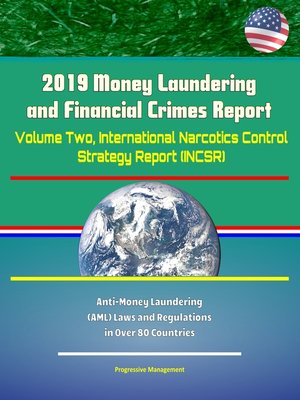2019 Money Laundering and Financial Crimes Report--Volume Two, International Narcotics Control Strategy Report (INCSR), Anti-Money Laundering (AML) Laws and Regulations in Over...
ebook

Sign up to save your library
With an OverDrive account, you can save your favorite libraries for at-a-glance information about availability. Find out more about OverDrive accounts.
Find this title in Libby, the library reading app by OverDrive.



Search for a digital library with this title
Title found at these libraries:
| Library Name | Distance |
|---|---|
| Loading... |
This report has been professionally converted for accurate flowing-text e-book format reproduction. Volume 2 of the 2019 International Narcotics Control Strategy Report (March 2019 issuance) the section of the INCSR that reports on money laundering and country efforts to address it. The statute defines a "major money laundering country" as one "whose financial institutions engage in currency transactions involving significant amounts of proceeds from international narcotics trafficking". The determination is derived from the list of countries included in INCSR Volume I (which focuses on narcotics) and other countries proposed by U.S. government experts based on indicia of significant drug-related money laundering activities. Given money laundering activity trends, the activities of non-financial businesses and professions or other value transfer systems are given due consideration. Inclusion in Volume II is not an indication that a jurisdiction is not making strong efforts to combat money laundering or that it has not fully met relevant international standards. The INCSR is not a "black list" of jurisdictions, nor are there sanctions associated with it. The U.S. Department of State regularly reaches out to counterparts to request updates on money laundering and AML efforts, and it welcomes information.
1. Legislative Basis and Methodology for the INCSR * 2. Overview * 3. Training Activities * 4. Comparative Table * 5. Countries - Afghanistan * Albania * Algeria * Antigua and Barbuda * Argentina * Armenia * Aruba * Azerbaijan * Bahamas * Barbados * Belgium * Belize * Benin * Bolivia * Bosnia and Herzegovina * Brazil * British Virgin Islands * Burma * Cabo Verde * Canada * Cayman Islands * China, People's Republic of * Colombia * Costa Rica * Cuba * Curacao * Cyprus * Dominica * Dominican Republic * Ecuador * El Salvador * Georgia * Ghana * Guatemala * Guyana * Haiti * Honduras * Hong Kong * India * Indonesia * Iran * Italy * Jamaica * Kazakhstan * Kenya * Laos * Liberia * Macau * Malaysia * Mexico * Morocco * Mozambique * Netherlands * Nicaragua * Nigeria * Pakistan * Panama * Paraguay * Peru * Philippines * Russian Federation * St. Kitts and Nevis * St. Lucia * St. Vincent and the Grenadines * Senegal * Serbia * Sint Maarten * Spain * Suriname * Tajikistan * Tanzania * Thailand * Trinidad and Tobago * Turkey * Ukraine * United Arab Emirates * United Kingdom * Uzbekistan * Venezuela * Vietnam
Money laundering, both at the country and multilateral levels, remains a significant crime issue despite robust, multifaceted efforts to address it. While arriving at a precise figure for the amount of criminal proceeds laundered is impossible, some studies by relevant international organizations estimate it may constitute 2-5 percent of global GDP. It is a seemingly ubiquitous criminal phenomenon: money laundering facilitates many other crimes and has become an indispensable tool of drug traffickers, transnational criminal organizations, and terrorist groups around the world. Its nefarious impact is considerable: it contributes to the breakdown of the rule of law, corruption of public officials, and destabilization of economies, and it threatens political stability, democracy, and free markets around the globe. For these reasons, the development and implementation of effective AML regimes consistent with international standards and the ability to meet evolving challenges is clearly vital to the maintenance of solvent, secure, and reliable financial, commercial, and trade systems. Reducing money laundering's threat to U.S. interests is a national security priority reflected in the 2018 National Security Strategy and the 2017 Executive Order 13773, Enforcing Federal...







